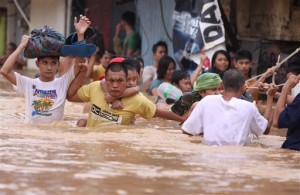
Residents hang on to a rope as they pass strong currents along a flooded area in Marikina City on Thursday. AP
MANILA, Philippines — At least 60 people are confirmed dead due to the relentless rains and floods that pounded Metro Manila and surrounding regions while thousands more survivors are crammed into evacuation centres on Friday as waist-high water covered vast farming regions.
The National Capital Region (NCR) accounted for majority of the fatalities with 26 while Region III or Central Luzon has 19, according to the latest report of the National Disaster Risk Reduction and Management Council (NDRRMC) Friday.
Region IV-A or Calabarzon has 12 fatalities, Region I or the Ilocos region has two, and Region IV-B or Mimaropa has one, it said.
A total of 39 victims died due to drowning, 11 died due to landslides, four due to electrocution, two suffered a heart attack, and four from unknown causes, it said.
The government’s disaster co-ordination council said that 60 people had been confirmed killed in this week’s floods, triple the number on Thursday.
The extra deaths occurred mainly in the provinces during the initial deluges from Monday to Wednesday, but government officials in the outlying areas could not immediately report the casualties to Manila headquarters, the council said.
“A lot of them have just reported now because their first priority was response (to the floods),” Anna Orallo, the council’s deputy administrator, told AFP.
The number of people now confirmed killed across the country since the rains first began in late July is 113, according to the council’s data.
The number of affected families has reached 2,442,135 people throughout 1,849 villages.
As much as 3,135 houses have been damaged by the floods and rains, it said.
The flooding that submerged 80 percent of Manila early in the week had largely subsided, allowing people to return to their homes, but vital rice-growing areas to the north remained submerged as more rain fell there.
Relief supplies distributed by the Department of Social Welfare and Development to disaster struck areas amounted to P38,328,830, it said.
“We need something to eat. I haven’t gone to work or been paid for a week,” said Rogelio Soco, a construction worker and father-of-three in the small farming town of Apalit, about 60 kilometres (40 miles) from Manila.
Soco, 60, said the floods, which began on Monday, were the worst the area had seen since a huge typhoon struck in the early 1970s, and other locals also said they had not experienced anything like it for decades.
Around Apalit, formerly green rice paddies had been turned into an enormous inland ocean of brown water.
Some people stood waist-deep in water and fished in the rice fields as rain continued to fall, while others hitched rides from town to town on government-provided flat-bed trucks.
Nearly two weeks of monsoon rains across the Philippines’ main island of Luzon peaked with a 48-hour deluge earlier this week that battered Manila and surrounding regions.
One person, identified as Regle Santos, 22, was added to the list of injured persons, bringing the total to five injured.
Seven people remain missing. Among those missing is Jason Pendido, 16, from Manaoag, who is said to have been swept away by strong currents of Sinukalan River of Pangasinan.
Also missing were Alvin Galang of Dinalupihan, Danilo Masangkay of Orion, Rolando Capistrano and Anthony Ramos of Olongapo, Lando Montiano and Val Valenzuela, both from fishermen from Oriental Mindoro.
Meanwhile the government said it was struggling to cope with the scale of a relief effort across Luzon that was expected to last for weeks.
Tens of thousands of people were continuing to stream into evacuation centres that were already overcrowded and unable to provide enough immediate relief goods.
“The water is still high and the local government units are getting overwhelmed,” Social Welfare Secretary Corazon Soliman told Agence France-Presse, referring to the farming provinces north of Manila where she was touring on Friday.
“We have evacuation centres that are congested. That is the whole problem.”
Just over 362,000 people were sheltering in evacuation centres on Friday, nearly 50,000 more than on Thursday, according to the disaster council.
The number of people officially affected by the floods also rose to 2.44 million, from 2.1 million on Thursday.
In Manila, clean-up operations were under way in riverside communities that endured waters up to two metres (six and a half feet) high on Tuesday and Wednesday.
Francesca Deimoy, 54, a resident of Marikina that was one of the worst-hit districts, said the community was worried about further flooding, with the monsoon season only just beginning.
“I sometimes feel like I could cry because you don’t know what to do. You think the worst is over and then the flood comes back,” she said.
The Southeast Asian archipelago endures about 20 major storms or typhoons each rainy season, many of which are deadly.
But this week’s rains were the worst to hit Manila since Tropical Storm Ketsana killed 464 people in 2009.
Environment Secretary Ramon Paje warned that the Philippines must prepare for more intense rains caused by climate change, describing the latest deluge as the “new normal”.
Orinally posted at 12:55 p.m.